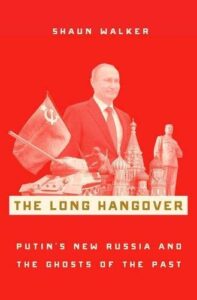

Putin’s Russia: The Definitive Account of Putin’s Rise to Power by Anna Politkovskaya
Harvill Press, 320pp, £10.99
The journalist Politkovskya told us exactly who Vladimir Putin was back in 2004, two years before she was assassinated in Moscow. It is both sobering and instructive to read her account of the horrors of the Second Chechen War between 1999 and 2009, carried out on Putin’s orders, given the subsequent invasion of Ukraine. A prophetic account of what was to come.

The Return of the Russian Leviathan by Sergei Medvedev
Polity, 140pp, £17.99
A professor at the Higher School of Economics in Moscow, Medvedev produces a brilliant collection of essays on the ideas, politics and history that are shaping contemporary Russian society under Putin, and how the Kremlin appeals to nostalgia and nationalism to stoke regime support.

Putin v. the People: The Perilous Politics of a Divided Russia by Samuel A Greene and Graeme B Robertson
Yale, 296pp, £20.00
Drawing on extensive on-the-ground research, including focus groups and opinion surveys, Greene and Robertson examine the roots of Putin’s popularity and his support across different sections of Russian society. The current situation has revealed the importance of understanding who supports Putin and why.

Citizens and the State in Authoritarian Regimes: Comparing China and Russia, edited by Karrie Koesel, Valerie Bunce, Jessica Chen Weiss
Oxford University Press, 344pp, £23.49
Among this collection of articles, Aleksandar Matovski’s chapter on the logic of Putin’s popular appeal and his efforts to position himself as defending Russia against its external enemies and “making Russia great again”, is particularly pertinent. Other scholars examine the role of patriotic education and propaganda in authoritarian systems. This would be a good book to pair with Timur Kuran’s Private Truths, Public Lies (1995) on why and how public opinion still matters under authoritarian rule.

The Invention of Russia: The Journey from Gorbachev’s Freedom to Putin’s War by Arkady Ostrovsky
Atlantic Books, 400pp, £9.99
This terrific, short history relays the experience of economic chaos and humiliating decline that accompanied the Soviet Union’s collapse for its citizens. It also describes how Putin and his inner circle took power and seized control of the media to shape the president’s popular image during his first decade in power.

Nothing is True and Everything is Possible: Adventures in Modern Russia by Peter Pomerantsev
Faber & Faber, 304pp, £9.99
This remains one of the best (and most beautifully written) books on Putin and modern Russia in recent years. Pomerantsev’s work captures both the dizzying pace of change in Russia during the economic boom of Putin’s first two terms, and the endemic corruption and compromise that came with it. Though only seven years old, Pomerantsev’s Russia of excitement and possibility already feels like a different world from the repression and censorship that has since risen to the fore. It ably gives a sense of what has and is being lost.

Between Two Fires: Truth, Ambition and Compromise in Putin’s Russia by Joshua Yaffa
Granta Books, 368pp, £12.99
A fascinating character study of life in contemporary Russia under Putin, this work uncovers the trade-offs and compromises that individuals make under authoritarian rule. It is worth reading alone for the story of the zookeeper from Crimea during Russia’s annexation of the peninsula by Russia in 2014.
Putin’s People: How the KGB Took Back Russia and Then Took on the West by Catherine Belton

William Collins, 640pp, £8.49
An exhaustive account of Putin’s rise, from Dresden in the 1980s to the Kremlin. Belton explores his links with oligarchs, and the way those relationships have evolved over the years – to the point where Putin now uses oligarchs as messengers in return for allowing them to amass huge fortunes. Anyone who steps out of line pays the price. Belton is devastating on the extent of Kremlin-driven corruption and the salting away of illicit wealth overseas.

The Future is History: How Totalitarianism Reclaimed Russia by Masha Gessen
Granta Books, 528pp, £10.99
Gessen uses the life stories of four young Russians born in the 1980s to frame how Russia first opened up politically, then closed itself off again, with decreasing space for dissent. A vivid and deeply personal work of analysis.

The Road to Unfreedom: Russia, Europe, America by Timothy Snyder
Bodley Head, 368pp, £10.99
A historian at Yale, Snyder dissects Putin’s thinking and the philosophers that inspired him. The book is especially good on the first Russian invasion of Ukraine in 2014, and excoriates the West’s complacency and failure to understand the political and geopolitical forces at work.

Chernobyl: History of a Tragedy by Serhii Plokhy
Allen Lane, 432pp, £9.99
Plokhy analyses the ossification of policy and command structures in Soviet Ukraine that allowed the 1986 Chernobyl nuclear disaster to happen. This is a story of how design flaws were compounded by human frailty.

All the Kremlin’s Men: Inside the Court of Vladimir Putin by Mikhail Zygar
PublicAffairs, 400pp, £14.99
Anyone interested in Kremlinology or in separating speculation from reality about the inner workings of the Kremlin and of Putin’s own circle should read this book.

The Long Hangover: Putin’s New Russia and the Ghosts of the Past by Shaun Walker
Oxford University Press, 288pp, £14.99
Putin’s call for “denazification” and attempted erasure of Ukrainian history makes this an ideal time to revisit Walker’s work on how historical narratives in Russia and Ukraine are used – and abused – in national politics.

Second-Hand Time by Svetlana Alexievich
Fitzcarraldo Editions, 704pp, £14.99
Alexievich’s brilliant oral history of the collapse of the Soviet Union reminds us that the best way to understand what is happening to a people is to ask them.
Disclosure: If you buy books linked to our site, we may earn a commission from Bookshop.org, whose fees support independent bookshops.
[See also: Books of the year 2022]






